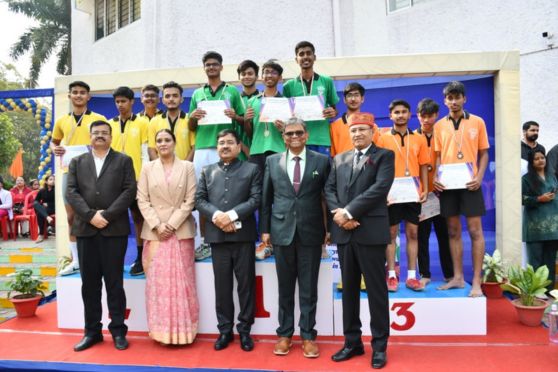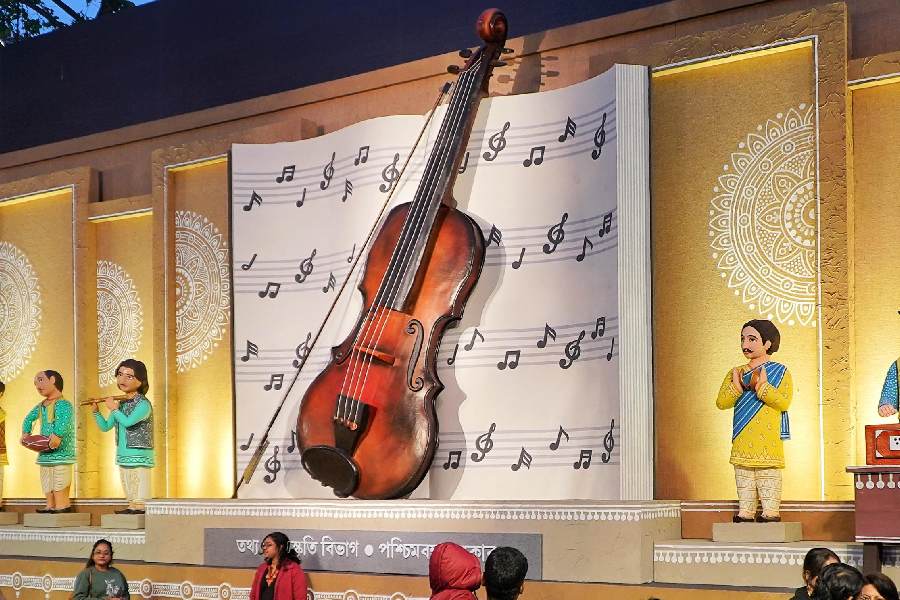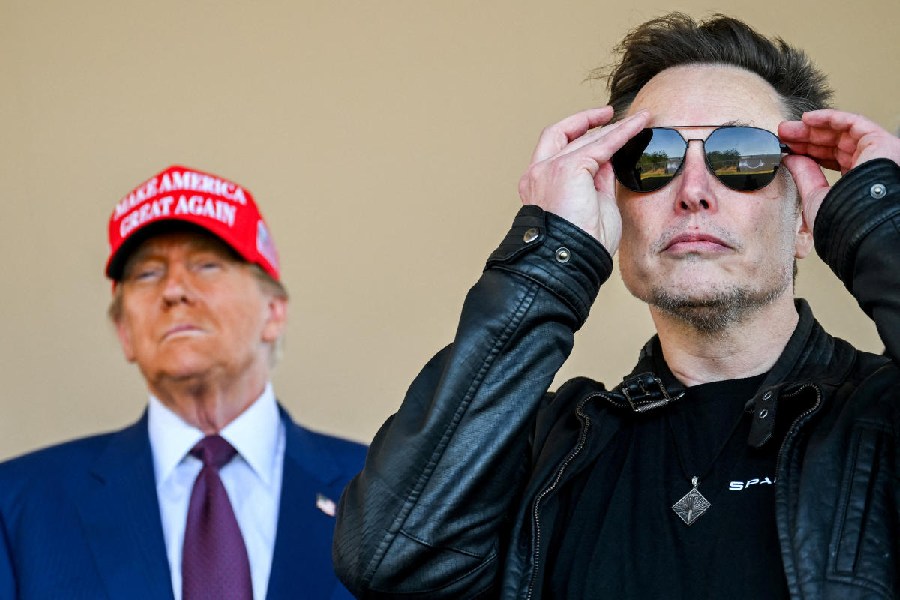 Friday, 03 January 2025
Friday, 03 January 2025
 Friday, 03 January 2025
Friday, 03 January 2025
He has judgments such as the Ayodhya land dispute, the abrogation of Article 370 and the decriminalisation of consensual gay sex that shaped society and politics to his name. India’s 50th chief justice D Y Chandrachud, known also for his many pithy statements, leaves an imprint all his own on the annals of legal history.
Friday was the last day in court for Chandrachud, or DYC as he is often referred to, capping a long career as lawyer, Supreme Court judge and head of the country’s judiciary. The ever articulate Chandrachud, who actually demits office on Sunday, penned more than 500 judgments, some panned and many praised.
The Chandrachud legacy has a physical manifestation too - a reimagined ‘Lady Justice’. The earlier ‘Goddess of Justice’ in Grecian robes with blindfold and sword has been replaced by a six-ft tall sculpture with scales in one hand and the Constitution in another. She is in a sari, with a crown and sans blindfold.
While that created a stir so did the decision on his penultimate day at work with the Supreme Court rechristening its summer vacation "partial court working days", an issue that has led to criticism that the apex court judges enjoyed long breaks.
DYC followed in the footsteps of his father Y V Chandrachud, who served as the CJI with the longest tenure between 1978 and 1985, the only instance of a father and son occupying the highest seat in the highest court of India.
The son, who studied in Delhi’s St Stephen’s College and Campus Law Centre and then went on get an LLM degree and a doctorate from the Harvard Law School, became chief justice on November 9, 2022.
The list of judgments penned by him is long and covers almost all aspects of law. They blend scholarship and jurisprudence and are likely to inform both future decisions and how the law is studied.
The verdicts have included establishing the judiciary’s commitment to protecting individual rights and advancing justice, expanding the scope of fundamental rights to include privacy and invalidating the electoral bond scheme.
He was part of a landmark judgment by a five-judge constitution bench that recognised the 'living will' made by terminally-ill patients for passive euthanasia.
The formidable Chandrachud was also part of several Constitution benches and wrote landmark verdicts, including the contentious Ayodhya land title dispute.
He was author of the unanimous 2019 verdict in the Ram Janmabhoomi-Babri Masjid land dispute which settled the fractious issue going back more than a century and paved the way for construction of the temple. Ranjan Gogoi was chief justice at the time and heading the five-judge bench.
In his last days in office, the CJI stirred another controversy when he said in a public function that he prayed to the “deity” for a solution to the polarising dispute. The comment was reproduced widely and elicited sharp reactions from various quarters, including politicians and activists, Chandrachud, who also attracted attention when Prime Minister Narendra Modi attended a widely publicised Ganesh puja at his home, was the author of the lead judgment that unanimously upheld the 2019 revocation of Article 370 that gave special status to the erstwhile state of Jammu and Kashmir.
Besides, he was on the bench that delivered path-breaking judgments on decriminalising same-sex relations and partially struck down Section 377 of the IPC on so-called unnatural sex (of carnal intercourse against the order of the nature).
However, the long-pending issue of granting legal sanction to same sex marriage went against the LGBTQIA++ community and a five-judge bench headed by Chandrachud refused to accord legal recognition to it.
He was also part of a nine-judge bench and key author of the unanimous verdict that declared the right to privacy a fundamental right under Article 21 (life and personal liberty).
The CJI, one of the most prolific judges in independent India, led the charge for significant administrative reforms, including the continued digitisation of court records and processes as a part of the ongoing e-Courts project.
The list is long.
He expanded the scope of the Medical Termination of Pregnancy Act and the corresponding rules to include unmarried women, even transgender, for abortion between 20-24 weeks of pregnancy.
Chandrachud also ruled on ticklish issues, declaring that criminalising adultery was arbitrary and archaic, and recognising the living will made by terminally ill patients He wrote judgments on power tussles between Delhi government and the lieutenant governor. In May 2023, the bench led by him held that the Delhi government would have control over all services in the National Capital Territory of Delhi.
The case that arose from the change in law which gave back the powers to Delhi lieutenant governor is still pending adjudication and remains one of Chandrachud’s unfinished works.
Consequential matters relating to the Maharashtra political crisis and the fight over rival factions for control of parties like Shiv Sena and the NCP are also still pending.
Chandrachud will be remembered for his sharp comments made in his judgments and public speeches.
"Sunlight is the best disinfectant," he said memorably in 2018 while batting for web-casting of court proceedings and ordering the live-streaming of important matters.
Post COVID-19, he made pioneering efforts in ensuring live-streaming of proceedings in all courts and tribunals across the country. And so it is today that laypersons and legal experts can access court proceedings anywhere and everywhere.
He was the first person to term the brutal second wave of the Covid pandemic in 2021 a "national crisis".
And just last week, he once again articulated his oft-repeated policy of “bail is the rule and jail the exception”. At the Express Adda, he said he has granted bail from A to Z (Arnab Goswami to Mohd Zubair) as part of his philosophy.
He has also been criticised for some of his interventions.
Chandrachud was the author of the judgment that rejected PILs seeking a probe into the death of special CBI judge B H Loya and ruled that he had died of "natural causes". Loya, who was hearing the high-profile Sohrabuddin Sheikh fake encounter case, died of cardiac arrest in Nagpur on December 1, 2014 when he had gone to attend the wedding of a colleague's daughter.
Chandrachud, who was elevated to the top court on May 13, 2016, was born on November 11, 1959. He was a judge of the Bombay High Court from March 29, 2000 until his appointment as the chief justice of the Allahabad High Court from October 31, 2013.
Before that, he was designated senior advocate by the Bombay High Court in June 1998 and became additional solicitor general the same year till his appointment as a judge.
He practised law at the Supreme Court and the Bombay High Court and was a visiting professor of comparative constitutional law at the University of Mumbai.
Besides his legal acumen, Chandrachud is known for his love of cricket, which, according to some accounts, he played in the backyard of the bungalow Chandrachud Sr was allotted in Lutyens Delhi.
The fond family man is often photographed with his children and wife. He has two lawyer sons, Abhinav and Chintan, and two specially-abled foster daughters Priyanka and Mahi.







